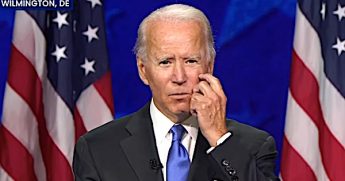
On Friday, South Korean President Moon Jae-in became the second world leader to visit the White House since President Joe Biden took office. Our president decided to honor the visit with a classic gaffe straight from the Biden playbook.
In this case, the president’s solecism came during his remarks after a meeting in which Biden said the delegations “discussed ways that the Republic of Korea and the United States will work together to address the challenges of our time,” according to a White House transcript.
In addition to working together on pandemic-related issues, Biden said, the two nations would also work together on fighting climate change and ensuring both countries were at the forefront of new technological developments.
“We also talked about how to harness our nation’s technological advantages to ensure the Republic of Korea and the United States are cooperating to shape — to shape emerging technologies around our shared value system,” Biden said.
And commence gaffery now:
“This includes everything from strengthening our cybersecurity to deepening our cooperation to build out an open secure G5 network — 5G network, I should say. I’m talking about the G-5, that’s another organization,” Biden said to laughter.
“I’m thinking organization, Mr. President — to secure the 5G networks.”
There’s a bit of problematic irony here, inasmuch as the “G-5” includes the nation we’re most concerned about securing 5G networks from.
For the uninitiated, the “G-5” is shorthand for a group of developing countries whose economies are considered nearly on par with those of the major industrialized nations, which are collectively known as the Group of 7, or G-7. The G-7 is made up of the United States, Canada, France, Germany, Great Britain, Italy, and Japan.
In the G-5, the 900-lb. gorilla in the room is China, although it shares the space with Brazil, India, Mexico and South Africa.
China’s technology company Huawei has emerged as one of the leaders — if not the leader — in 5G infrastructure technology. Given the amount of control Beijing has over Huawei, this obviously leads to serious concerns about safeguarding the 5G mobile networks of the future from the G-5’s most powerful member.
The gaffe also came during a news conference where President Biden said he and Moon Jae-in remained “deeply concerned” about tensions with North Korea.
“Our two nations also share a willingness to engage diplomatically with [North Korea] to take pragmatic steps that will reduce tensions as we move toward our ultimate goal of denuclearization of the Korean Peninsula,” Biden said.
“Today, I affirm to President Moon that the United States will proceed in close consultation with the Republic of Korea and our strategy and our approach.”
(At least Biden got Moon’s job title right that time. Also Friday, as the New York Post reported, Biden referred to the South Korean president as “the prime minister of Korea” while bestowing the Medal of Honor on a 94-year-old retired Army colonel for heroic actions during the Korean War.)
Biden admitted that the two leaders were “under no illusions how difficult this is – none whatsoever. The past four administrations have not achieved the objective. It’s an incredibly difficult objective.”
Since Biden took office, Kim Jong-un’s regime has been ramping up its rhetoric. After the president’s address to a joint session of Congress last month, in which he called the nuclear programs of Iran and North Korea “serious threats to American security and the security of the world,” several North Korean sources issued strongly worded statements condemning the speech.
“It is certain that the U.S. chief executive made a big blunder,” said Kwon Jong-gun, a senior North Korean Foreign Ministry official, according to The New York Times.
The speech, Kwon said, “clearly reflects his intent to keep enforcing the hostile policy toward” North Korea, and Pyongyang “will be compelled to press for corresponding measures, and with time the U.S. will find itself in a very grave situation.”
An unnamed spokeseman within the North Korean foreign ministry, meanwhile, said Biden’s criticism of North Korea’s human rights record showed the United States was “girding itself up for an all-out showdown,” according to CNBC.
All of which is to say that maybe Friday wasn’t the time for a “tee hee, Uncle Joe made another accidental funny” moment — especially not one that elicited reactions like this:
It’s terrifying that he has the nuclear codes.
— Robby Starbuck (@robbystarbuck) May 21, 2021
This makes two visits to Washington so far from world leaders and two thoroughly Biden-esque gaffes from those occasions, just in case you were keeping count.
When Japanese Prime Minister Yoshihide Suga came over in April, shortly after 29-year-old Hideki Matsuyama won the Masters golf tournament, Biden told the prime minister, “I know how proud you are of the people of Japan are in — you’ve got a Japanese boy coming over here, and guess what, he won the Masters.”
That was merely ineloquent, infantilizing and — as the left was busy wringing its hands over Asian stereotyping — supremely bad optics.
Biden’s Friday gaffe was during a joint news conference with the leader of South Korea that was, in part, to project unity and strength against North Korea, a nuclear-armed rogue state. Don’t think Biden’s G-5/5G fumbling went unnoticed there, and don’t think the North Koreans won’t try to take advantage of this to paint Biden as weak and intellectually unfit for his role.


